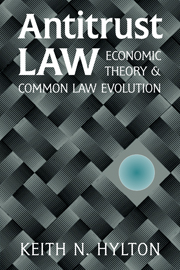Book contents
- Frontmatter
- Contents
- Preface
- 1 Economics
- 2 Law and Policy
- 3 Enforcement
- 4 Cartels
- 5 Development of Section 1 Doctrine
- 6 Rule of Reason and Per-Se Rule
- 7 Agreement
- 8 Facilitating Mechanisms
- 9 Boycotts
- 10 Monopolization
- 11 Power
- 12 Attempts
- 13 Vertical Restraints
- 14 Tying and Exclusive Dealing
- 15 Horizontal Mergers
- 16 Mergers, Vertical and Conglomerate
- 17 Antitrust and the State
- Index
1 - Economics
Published online by Cambridge University Press: 12 November 2009
- Frontmatter
- Contents
- Preface
- 1 Economics
- 2 Law and Policy
- 3 Enforcement
- 4 Cartels
- 5 Development of Section 1 Doctrine
- 6 Rule of Reason and Per-Se Rule
- 7 Agreement
- 8 Facilitating Mechanisms
- 9 Boycotts
- 10 Monopolization
- 11 Power
- 12 Attempts
- 13 Vertical Restraints
- 14 Tying and Exclusive Dealing
- 15 Horizontal Mergers
- 16 Mergers, Vertical and Conglomerate
- 17 Antitrust and the State
- Index
Summary
In this chapter, I will introduce economic concepts that I plan to use throughout the text, set out the basic economics of monopoly, and compare monopoly with its polar opposite, perfect competition. I also will discuss some relatively new topics, such as transaction-cost and information economics, and their relevance to antitrust policy.
DEFINITIONS
Monopoly
A monopolist is a single supplier of a good. However, this definition is too simple, because it includes firms that become dominant by being the lowest-cost competitor and those that obtain an exclusive franchise from the state. As far as antitrust policy is concerned, there is a big difference between these two cases. Because the simple, “single-supplier” definition is potentially misleading, one should focus on market conditions. The crucial feature of monopoly status is the absence of competition from other firms.
The common example of monopoly in our lives is local telephone service, provided in most places in the United States by a regulated, privately owned monopoly. However, even here competition from wireless and optical fiber companies has eroded the monopoly status of the local telephone companies. One of the purest monopolies in recent memory was Aeroflot, the airline of the former Soviet Union. Before the breakup of the Soviet Union, there were no competing airlines.
Market Price
A market equilibrium, where the quantity demanded by consumers equals the quantity supplied by producers, generates a market price, as shown in Figure 1.1.
- Type
- Chapter
- Information
- Antitrust LawEconomic Theory and Common Law Evolution, pp. 1 - 26Publisher: Cambridge University PressPrint publication year: 2003

